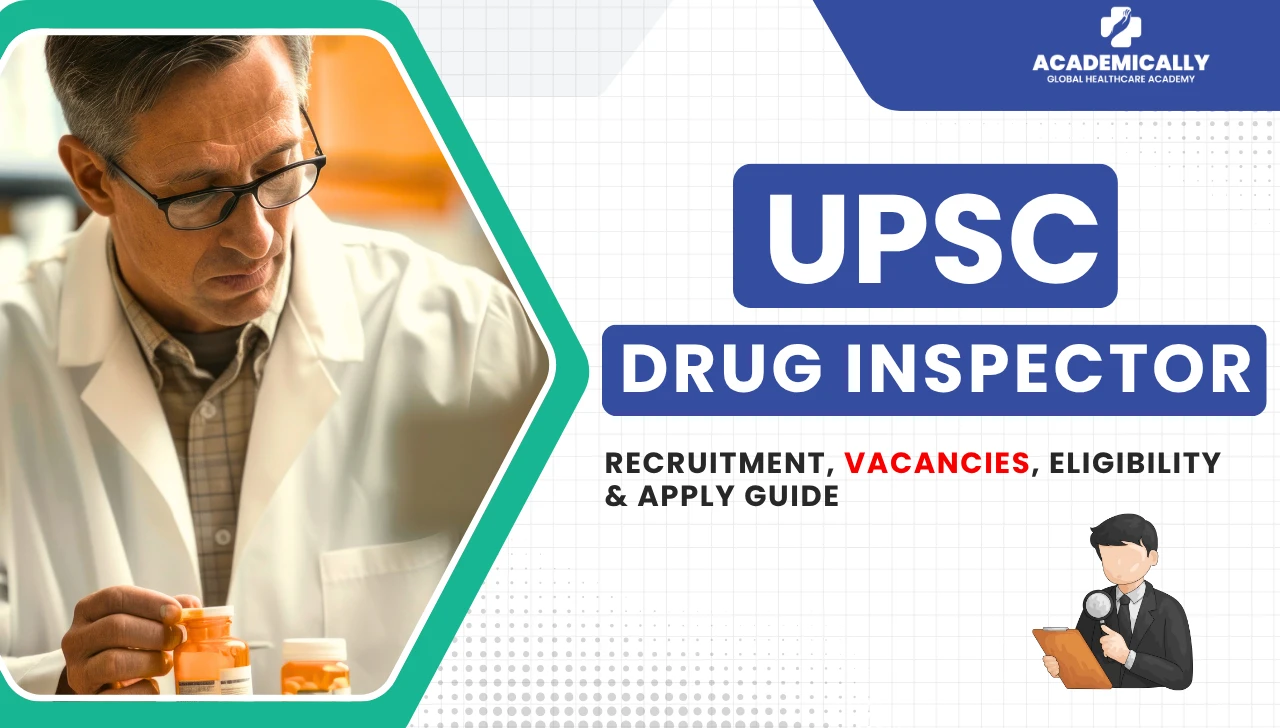Dreaming of a government job that blends science, medicine, and public service?
Then you’re exactly where you should be because becoming a Drug Inspector through UPSC is one of the smartest ways to turn your pharmacy degree into a powerful, impactful career.
Let’s break it all down from eligibility to pay scale in a simple guide that has all the information you need.
What exactly is the UPSC Drug Inspector job?
Imagine being the person who makes sure every pill, injection, and medical device in the market is safe, effective, and approved.
That’s basically what a Drug Inspector does: they ensure that the medicines and devices people rely on every day meet India’s strict quality and safety standards.
In short, it’s a Group B, Gazetted (Non-Ministerial) role, and you’d be working at the heart of India’s healthcare regulatory system.
Why this job is a big deal
If you’ve ever thought, “I love pharmacy, but I also want growth, recognition, and stability,” this is the one for you.
Here’s why:
- Prestige + Stability: Central government post, solid pay, and respect.
- National impact: You’ll ensure that unsafe drugs don’t reach patients.
- Great pay scale: Level-08 under the 7th Pay Commission, that’s ₹47,600–₹1,51,100 per month.
- Perks: DA, HRA, TA, medical, pension.
- Perfect for freshers: In 2025, freshers were eligible too. So if you’re just out of college, don’t worry you can apply.
Basically, if “science + service” is your vibe, this is the role to chase.

UPSC Drug Inspector 2026 – Key Highlights
Here’s a quick overview so you can get a realistic idea of what’s coming:
Feature | 2025 Data | What to Expect in 2026 |
Recruitment Authority | UPSC (Central Drugs Standard Control Organisation) | Same |
Post Name | Drug Inspector (Medical Devices) | Same |
Vacancies | 20 posts | 419* (can vary depending on the workload) |
Pay Level | Level-08 (₹47,600 – ₹1,51,100) | Same |
Application Dates | 24 May – 12 June 2025 | Around May–June 2026 |
Max Age | 30 years (UR) | Same with relaxations |
Selection Process | Written exam + document verification/interview | Same |
Official Website | ||
So yes, you’ll likely see the 2026 exam notification drop around May or June, with a 2–3 week window to apply.

Eligibility Criteria
Before you start celebrating, make sure you actually qualify for the exam. Let’s simplify the eligibility part:
1. Educational Qualification
Qualification Type | Eligible Fields of Study |
B.E. / B.Tech Degree | Biomedical Engineering, Chemical Engineering, Mechanical Engineering, Electrical Engineering, Electronics Engineering, Instrumentation Engineering, Biotechnology, Polymer Engineering, Computer Science, or Medical Electronics |
Bachelor’s Degree | Pharmacy, Pharmaceutical Sciences, Microbiology, Biochemistry, Chemistry, or Life Sciences |
2. Age Limit
- Maximum Age: 30 years (General Category).
- Relaxations:
- OBC – 3 years
- SC/ST – 5 years
- PwBD and Govt. employees – as per norms.
Age is calculated as on the last date of application, so plan accordingly.
3. Experience
Here’s the good news
The 2025 recruitment allowed freshers! No mandatory work experience.
But earlier rules mentioned:
- 18 months in testing of drugs, or
- 3 years in inspection under the Drugs & Cosmetics Act.
So for 2026, check if this remains optional or becomes required again.
Category-wise Vacancy
To give you an idea of how seats were distributed last year:
| Category | No. of Vacancies as per 2025 |
| UR | 7 |
| EWS | 3 |
| OBC | 5 |
| SC | 3 |
| ST | 2 |
| Total | 20 |
Additionally, 2 posts were reserved for Persons with Benchmark Disabilities (PwBD).
For 2026, expect a similar pattern UPSC follows central government reservation policies strictly.
Salary & Perks – What You’ll Earn
Let’s talk numbers (everyone’s favorite part).
- Pay Scale: Level-08 of the 7th CPC — ₹47,600 to ₹1,51,100/month.
- Allowances: DA, HRA, TA, medical, etc.
- Total in-hand salary: Usually around ₹70,000–₹85,000 per month (depending on location).
- Extras: Pension, gratuity, leave travel, and official accommodation (where available).
Basically it’s not just a job, it’s a secure future.
Selection Process & Exam Pattern
Alright, how do you actually get selected?
Step 1: Written Exams
| Stage | Exam Type | Duration of Exam | Marks |
| Preliminary Exam | Objective | 2 hours | 200 |
| Main Exam | Descriptive | 3 hours | 300 |
- Subjects:
- Pharmaceutical Sciences
- Chemistry (Organic, Inorganic, Analytical)
- Pharmacology
- Drug Laws & Regulations
- Microbiology / Biochemistry
- General Knowledge / Current Affairs
Step 2: Interview / Document Verification
If you qualify the exam, you’ll move to the verification and interview stage.
Here, your technical knowledge, communication, and awareness about drug regulation will be tested.
Step 3: Final Merit List
The final selection is made based on your written + interview marks (if conducted), followed by medical and document verification.
How to Apply (Step-by-Step)
Once UPSC releases the notification — here’s your roadmap:
- Visit the official website.
- Register / Login on the ORA (Online Recruitment Application) portal.
- Find the Advertisement for “Drug Inspector (Medical Devices)” under CDSCO.
- Fill in details — personal info, educational qualifications, experience (if any).
- Upload documents — photo, signature, degree certificates, category proof, etc.
- Pay the fee (₹25 for General/OBC; free for SC/ST/PwBD/Women).
- Submit the form and download the confirmation.
Important: Don’t wait till the last day UPSC servers tend to get jammed close to deadlines!
How to Prepare
Let’s be real it’s a competitive exam. But you can totally nail it with the right strategy.
Here’s your preparation game plan:
- Understand the syllabus don’t skip the small topics like “Drug Rules & Schedules.”
- Study standard books:
- C.V.S. Subrahmanyam (Physical Pharmaceutics)
- K.D. Tripathi (Pharmacology)
- Lachman/Lieberman (Pharmaceutical Technology)
- Drugs & Cosmetics Act bare act version.
- Take AI mock tests they help with time management.
- Revise regularly pharma laws and chemical reactions need memory reinforcement.
- Stay updated read about new drug policies, AI in pharma, and regulatory news.
- Join study groups discussions help clarify confusing topics.
Consistency beats intensity even 3–4 hours daily with focus can take you far.
After Selection: What Happens Next?
Once you clear the exam and join as a Drug Inspector, you’ll be working under CDSCO or other regional drug regulatory offices.
Your duties may include:
- Inspecting drug & device manufacturing facilities
- Sampling and testing of products
- Ensuring compliance with the Drugs & Cosmetics Act
- Reporting violations and taking regulatory action
Over time, you can rise to Senior Drug Inspector, Assistant Drug Controller, or even Deputy Drugs Controller all respected, powerful positions in public health governance.
Quick Recap Checklist
Before the notification drops:
- Check your degree eligibility
- Keep ID proofs and documents ready
- Read up on the Drugs & Cosmetics Act, 1940
- Start revising core pharma subjects
- Bookmark important websites for updates
- Stay consistent — this is not a one-week prep exam!
Final Thoughts
Getting into UPSC Drug Inspector isn’t just about a government job it’s about joining the core health protection system of India.
You’ll ensure millions get safe medicines and devices and that’s something to be proud of.
So if you’ve got the degree, determination, and a bit of discipline the 2026 UPSC Drug Inspector exam could open a whole new chapter of your career.
Ready to start your preparation? Begin today and take the first step towards a successful UPSC Drug Inspector journey!





